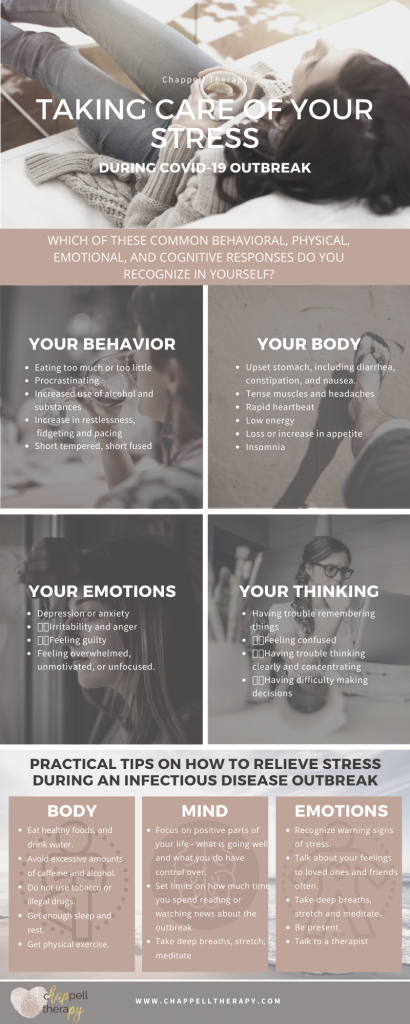
TAKING CARE OF YOUR STRESS DURING COVID-19 OUTBREAK
Coronavirus (COVID-19): Common Stress Reactions
As the situation relating to COVID-19 unfolds, including news reports, travel restrictions, and concerns for your own and your loved ones’ health – people can experience a wide range of thoughts, feelings and reactions.
Which of these Common behavioral, physical, emotional, and cognitive responses do you recognize in yourself?
YOUR BEHAVIOR
- Eating too much or too little
- Procrastinating
- Increased use of alcohol and substances
- Increase in restlessness,fidgeting and pacing
- Short tempered, short fused
YOUR BODY
- Upset stomach including diarrhea, constipation, and nausea.
- Tense muscles and headaches
- Rapid heartbeat
- Low energy
- Loss or increase in appetite
- Insomnia
YOUR EMOTIONS
- Depression or anxiety
- Irritability and anger
- Feeling guilty
- Feeling overwhelmed, unmotivated, or unfocused
YOUR THOUGHTS
- Having trouble remembering things
- Feeling confused
- Having trouble thinking clearly and concentrating
- Having difficulty making decisions
Strategies to Cope with Stress and Anxiety
Acknowledge your feelings. Allow yourself time to notice and express what you’re feeling. This could be by writing them down in a journal, talking to others, doing something creative, or practicing meditation.
Maintain your day-to-day normal activities and routine where possible. Having a healthy routine can have a positive impact on your thoughts and feelings. This can include: eating healthy meals, physical exercise like walking, running or stretching and doing things you enjoy.
Stay connected. Receiving support and care from others has a powerful effect on helping us cope with challenges. Spending time with supportive family and friends can bring a sense of comfort and stability. Talking through our concerns, thoughts, and feelings with others can also help us find helpful ways of thinking about or dealing with a stressful situation.
Set limits around news and social media. It’s understandable to want to keep informed, especially if you or your loved ones are affected. At the same time, constantly reading, watching, or listening to upsetting media coverage can unnecessarily intensify worry and agitation. Take a breaks from news or social media and make a point to focus on things that are positive in your life and actions you have control over.
